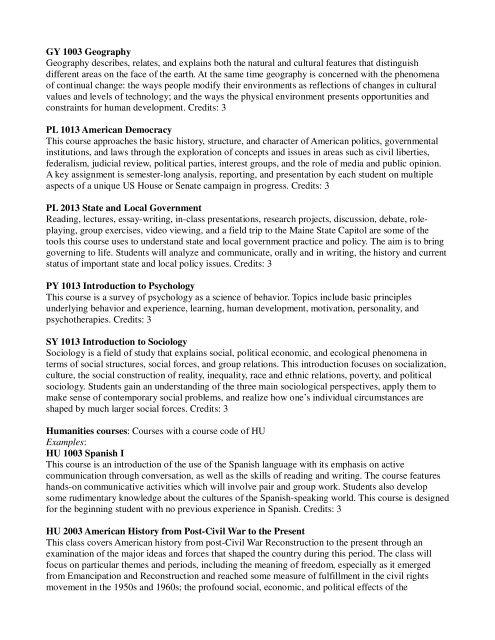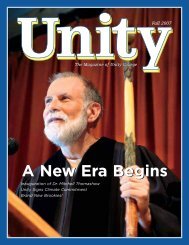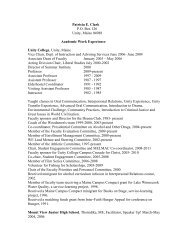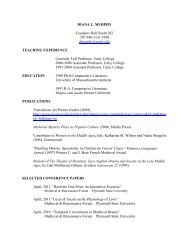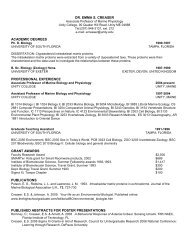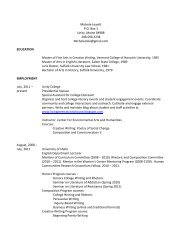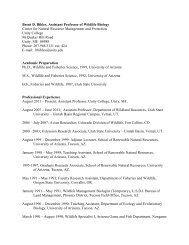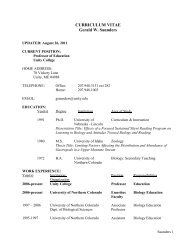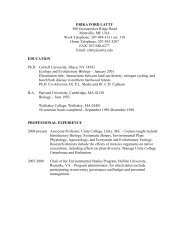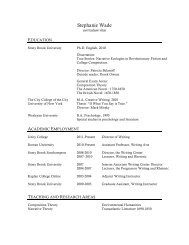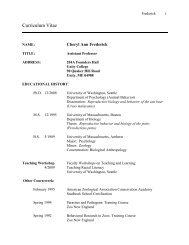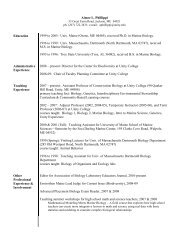Guide - Unity College
Guide - Unity College
Guide - Unity College
Create successful ePaper yourself
Turn your PDF publications into a flip-book with our unique Google optimized e-Paper software.
GY 1003 Geography<br />
Geography describes, relates, and explains both the natural and cultural features that distinguish<br />
different areas on the face of the earth. At the same time geography is concerned with the phenomena<br />
of continual change: the ways people modify their environments as reflections of changes in cultural<br />
values and levels of technology; and the ways the physical environment presents opportunities and<br />
constraints for human development. Credits: 3<br />
PL 1013 American Democracy<br />
This course approaches the basic history, structure, and character of American politics, governmental<br />
institutions, and laws through the exploration of concepts and issues in areas such as civil liberties,<br />
federalism, judicial review, political parties, interest groups, and the role of media and public opinion.<br />
A key assignment is semester-long analysis, reporting, and presentation by each student on multiple<br />
aspects of a unique US House or Senate campaign in progress. Credits: 3<br />
PL 2013 State and Local Government<br />
Reading, lectures, essay-writing, in-class presentations, research projects, discussion, debate, roleplaying,<br />
group exercises, video viewing, and a field trip to the Maine State Capitol are some of the<br />
tools this course uses to understand state and local government practice and policy. The aim is to bring<br />
governing to life. Students will analyze and communicate, orally and in writing, the history and current<br />
status of important state and local policy issues. Credits: 3<br />
PY 1013 Introduction to Psychology<br />
This course is a survey of psychology as a science of behavior. Topics include basic principles<br />
underlying behavior and experience, learning, human development, motivation, personality, and<br />
psychotherapies. Credits: 3<br />
SY 1013 Introduction to Sociology<br />
Sociology is a field of study that explains social, political economic, and ecological phenomena in<br />
terms of social structures, social forces, and group relations. This introduction focuses on socialization,<br />
culture, the social construction of reality, inequality, race and ethnic relations, poverty, and political<br />
sociology. Students gain an understanding of the three main sociological perspectives, apply them to<br />
make sense of contemporary social problems, and realize how one’s individual circumstances are<br />
shaped by much larger social forces. Credits: 3<br />
Humanities courses: Courses with a course code of HU<br />
Examples:<br />
HU 1003 Spanish I<br />
This course is an introduction of the use of the Spanish language with its emphasis on active<br />
communication through conversation, as well as the skills of reading and writing. The course features<br />
hands-on communicative activities which will involve pair and group work. Students also develop<br />
some rudimentary knowledge about the cultures of the Spanish-speaking world. This course is designed<br />
for the beginning student with no previous experience in Spanish. Credits: 3<br />
HU 2003 American History from Post-Civil War to the Present<br />
This class covers American history from post-Civil War Reconstruction to the present through an<br />
examination of the major ideas and forces that shaped the country during this period. The class will<br />
focus on particular themes and periods, including the meaning of freedom, especially as it emerged<br />
from Emancipation and Reconstruction and reached some measure of fulfillment in the civil rights<br />
movement in the 1950s and 1960s; the profound social, economic, and political effects of the


